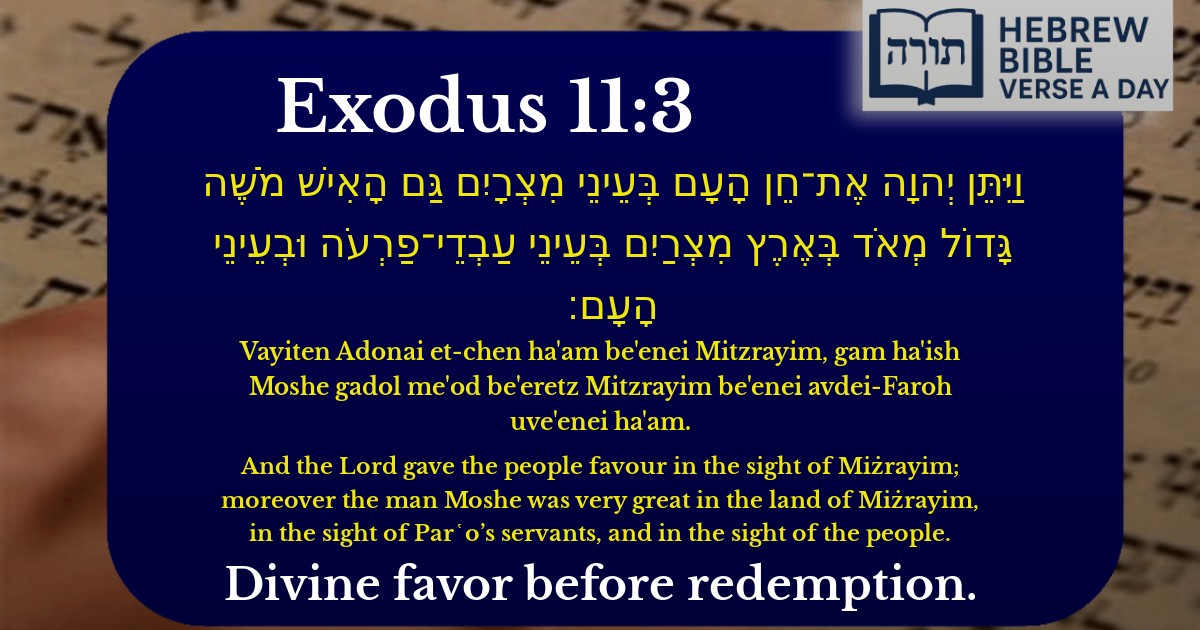Join Our Newsletter To Be Informed When New Videos Are Posted
Join the thousands of fellow Studends who rely on our videos to learn how to read the bible in Hebrew for free!
Hebrew Text
וַיִּתֵּן יְהוָה אֶת־חֵן הָעָם בְּעֵינֵי מִצְרָיִם גַּם הָאִישׁ מֹשֶׁה גָּדוֹל מְאֹד בְּאֶרֶץ מִצְרַיִם בְּעֵינֵי עַבְדֵי־פַרְעֹה וּבְעֵינֵי הָעָם׃
English Translation
And the Lord gave the people favour in the sight of Miżrayim; moreover the man Moshe was very great in the land of Miżrayim, in the sight of Par῾o’s servants, and in the sight of the people.
Transliteration
Vayiten Adonai et-chen ha'am be'enei Mitzrayim, gam ha'ish Moshe gadol me'od be'eretz Mitzrayim be'enei avdei-Faroh uve'enei ha'am.
Hebrew Leining Text
וַיִּתֵּ֧ן יְהֹוָ֛ה אֶת־חֵ֥ן הָעָ֖ם בְּעֵינֵ֣י מִצְרָ֑יִם גַּ֣ם <b>׀</b> הָאִ֣ישׁ מֹשֶׁ֗ה גָּד֤וֹל מְאֹד֙ בְּאֶ֣רֶץ מִצְרַ֔יִם בְּעֵינֵ֥י עַבְדֵֽי־פַרְעֹ֖ה וּבְעֵינֵ֥י הָעָֽם׃ <span class="mam-spi-samekh">{ס}</span>
וַיִּתֵּ֧ן יְהֹוָ֛ה אֶת־חֵ֥ן הָעָ֖ם בְּעֵינֵ֣י מִצְרָ֑יִם גַּ֣ם ׀ הָאִ֣ישׁ מֹשֶׁ֗ה גָּד֤וֹל מְאֹד֙ בְּאֶ֣רֶץ מִצְרַ֔יִם בְּעֵינֵ֥י עַבְדֵֽי־פַרְעֹ֖ה וּבְעֵינֵ֥י הָעָֽם׃ {ס}
🎵 Listen to leining
Parasha Commentary
📚 Talmud Citations
This verse is not quoted in the Talmud.


Divine Favor for Bnei Yisrael in Mitzrayim
The verse states that Hashem granted the Jewish people favor in the eyes of the Egyptians. Rashi (Shemot 11:3) explains that this favor was manifested when the Egyptians willingly lent their precious items to Bnei Yisrael before the Exodus, fulfilling the promise that they would leave with great wealth (Bereishit 15:14). The Sforno adds that this favor was necessary to ensure the Egyptians would not harm the Jews during the final plagues.
The Greatness of Moshe Rabbeinu
The Torah emphasizes that Moshe was "very great in the land of Mitzrayim." Ramban (Shemot 11:3) explains this refers to Moshe's elevated status as a leader and prophet, recognized even by Pharaoh's court. The Midrash (Shemot Rabbah 8:1) elaborates that Moshe's greatness included:
Dual Perspective on Moshe's Greatness
The verse specifies that Moshe was esteemed both by "Pharaoh's servants" and "the people." The Malbim notes this distinction:
This dual recognition reflects the complete nature of Moshe's leadership - both in spiritual and temporal matters.